GENERAL
Masters in Clinical Mental Health Counseling Jobs Worth Pursuing

Pursuing a masters in clinical mental health counseling jobs can lead to a highly fulfilling and impactful career in mental health services. With mental health gaining global attention, the demand for professional counselors has never been higher. This guide explores job opportunities available to individuals with a master’s in clinical mental health counseling, offering insights into the education pathway, licensing requirements, employment settings, and long-term career prospects.
Understanding Clinical Mental Health Counseling
Clinical mental health counseling is a specialized field within psychology focused on diagnosing and treating emotional, psychological, and behavioral issues. Professionals with a masters in clinical mental health counseling jobs work directly with individuals, families, and groups to promote wellness, manage crises, and improve overall mental health.
These counselors are trained in therapeutic techniques, psychological assessment, and evidence-based practices to provide high-quality mental healthcare.
Why Choose a Master’s in Clinical Mental Health Counseling?
A master’s degree is essential for becoming a licensed clinical mental health counselor. This program equips students with both theoretical knowledge and hands-on experience.
Key Benefits:
- Licensure Pathway: Enables eligibility for LPC (Licensed Professional Counselor), LMHC (Licensed Mental Health Counselor), and other credentials.
- Increased Job Opportunities: Expands access to a wide range of professional roles.
- Specialization Options: Allows focus on niche areas like trauma, addiction, family therapy, or youth counseling.
- Job Security: Mental health counselors are in high demand due to increasing awareness and decreased stigma.
Career Opportunities After Earning a Master’s
A degree in this field opens doors to various masters in clinical mental health counseling jobs. Some of the most common roles include:
Mental Health Counselor
These professionals diagnose and treat mental health issues, such as anxiety, depression, and PTSD. They often work in private practices, clinics, or hospitals.
Substance Abuse Counselor
These counselors work with individuals battling addiction. This position often requires specialized knowledge in dual diagnoses and recovery models.
School Counselor
Although it may require additional certifications, many professionals transition into academic environments to guide students through social and emotional challenges.
Marriage and Family Therapist
This role involves working with couples and families to resolve conflicts, build healthy communication patterns, and promote emotional well-being.
Behavioral Health Specialist
Behavioral health specialists often collaborate with psychiatrists, social workers, and other healthcare professionals to offer integrated care.
Comparison Table: Key Aspects of Top Counseling Careers
| Career Role | Average Salary (USD) | Work Environment | Education Requirement | Job Outlook | Licensing Needed |
| Mental Health Counselor | $50,000 – $70,000 | Clinics, Private Office | Master’s | High | Yes |
| Substance Abuse Counselor | $45,000 – $65,000 | Rehab Centers, Clinics | Master’s | Very High | Yes |
| School Counselor | $55,000 – $80,000 | Schools, Universities | Master’s + Certificate | High | Yes |
| Marriage & Family Therapist | $50,000 – $75,000 | Private Practice | Master’s | High | Yes |
| Behavioral Health Specialist | $60,000 – $85,000 | Hospitals, Government | Master’s | Growing | Yes |
Skills Required for Success
Professionals aiming for masters in clinical mental health counseling jobs need a diverse skill set beyond academic knowledge.
- Empathy and Compassion: Essential for client-centered care.
- Strong Communication: Facilitates effective therapy and collaboration.
- Ethical Judgment: Upholds confidentiality and professional standards.
- Problem-Solving: Critical in crisis intervention and treatment planning.
- Cultural Competence: Helps in serving diverse populations with sensitivity.
Licensing and Certification
After completing a master’s program, candidates must meet state-specific licensing criteria. This typically includes:
- Supervised Clinical Hours: Usually 2,000–4,000 hours.
- National Exams: Like the NCMHCE (National Clinical Mental Health Counseling Examination).
- Continuing Education: Required for license renewal and specialization.
Work Settings and Employers
Jobs in this domain span multiple sectors:
Community Health Centers
Often serve underprivileged communities, offering comprehensive mental health services.
Hospitals and Medical Centers
Collaborate with multidisciplinary teams in psychiatric and general hospitals.
Schools and Universities
Focus on academic advising and emotional support for students.
Private Practice
Offer flexibility and autonomy, with higher income potential for seasoned professionals.
Non-Profit Organizations
Engage in outreach, support, and policy advocacy in mental health.
Trends Shaping the Field
The landscape for masters in clinical mental health counseling jobs is evolving due to various trends:
- Teletherapy Expansion: More clients are accessing care online, creating remote job opportunities.
- Increased Focus on Youth Mental Health: Schools are hiring more counselors to combat rising emotional challenges among students.
- Integrated Care Models: Collaboration between mental and physical healthcare providers is becoming the norm.
- Policy Changes: Legislation is increasingly supporting mental health funding and insurance coverage.
Salaries and Growth Projections
According to industry data, the field is growing at a faster-than-average rate.
- Projected Growth: Over 22% through 2030, significantly higher than most occupations.
- Earning Potential: Increases with experience, specialization, and geographic location.
Clinical supervisors or counselors in private practice can earn six-figure incomes.
How to Choose the Right Program
Selecting the right master’s program is crucial for long-term success in masters in clinical mental health counseling jobs.
Considerations Include:
- Accreditation: Look for programs accredited by CACREP or similar bodies.
- Internship Opportunities: Practical experience is essential for licensure.
- Specializations Offered: Choose programs aligned with your career goals.
- Cost and Financial Aid: Evaluate tuition, scholarships, and loan options.
- Format: Consider online, hybrid, or in-person formats based on your lifestyle.
Testimonials from Industry Professionals
“My master’s in clinical mental health counseling prepared me for a dynamic and rewarding career. The field is emotionally challenging, but the impact you make on lives is priceless.”
— Angela M., LPC, New York
“The counseling profession offers diverse pathways. I started in substance abuse recovery and transitioned to trauma therapy, all thanks to my graduate training.”
— Jacob L., LMHC, Florida
Certification Options to Boost Employability
In addition to your license, additional certifications can make you more competitive:
- Certified Clinical Mental Health Counselor (CCMHC)
- National Certified Counselor (NCC)
- Certified Alcohol and Drug Counselor (CADC)
- Trauma-Focused CBT Certification
Challenges in the Profession
Despite the benefits, there are challenges associated with masters in clinical mental health counseling jobs:
- Emotional Burnout: Constant exposure to trauma and emotional struggles.
- High Caseloads: Especially in public or low-cost service centers.
- Licensing Hurdles: Varying requirements across states.
Strategies like ongoing supervision, work-life balance, and peer support can mitigate these issues.
Continuing Education and Advancement
Many states mandate continuing education to maintain licensure. Areas of ongoing learning may include:
- Emerging Therapies: Like EMDR, DBT, or mindfulness-based CBT.
- Cultural Awareness Training
- Supervision Skills: For those moving into leadership roles.
- Research and Publication: Ideal for professionals entering academia.
Start Your Journey with Confidence
The decision to pursue a masters in clinical mental health counseling jobs is one of commitment, passion, and service. Whether you’re helping clients overcome personal struggles or contributing to public mental health, your role will be essential in shaping healthier communities.
Conclusion
A masters in clinical mental health counseling jobs offers more than just employment—it provides a purpose-driven path where your work can lead to life-changing results. With the right education, certification, and dedication, you can build a successful, stable, and deeply rewarding career in mental health counseling.
FAQs
What can I do with a masters in clinical mental health counseling?
You can work as a licensed counselor in private practice, hospitals, schools, rehabilitation centers, or non-profits helping individuals manage mental health conditions.
How long does it take to become a licensed counselor?
Typically, it takes 6–8 years, including undergraduate studies, a master’s program, and supervised clinical hours required for licensure.
Is a master’s in clinical mental health counseling worth it?
Yes, it leads to high-demand careers with competitive salaries and meaningful impact in the community.
Do I need to specialize in my master’s program?
While not required, specializations in areas like trauma, substance abuse, or youth counseling can improve job prospects and focus your practice.
Can I work remotely in this field?
Absolutely. Many counselors now offer telehealth services, especially in post-pandemic settings, providing flexibility and broader client reach.
What’s the job outlook for mental health counselors?
The Bureau of Labor Statistics projects a growth rate of over 22% by 2030, reflecting high demand and excellent job security.
GENERAL
What Are Guinness Calories? Simple Nutrition Facts 2025
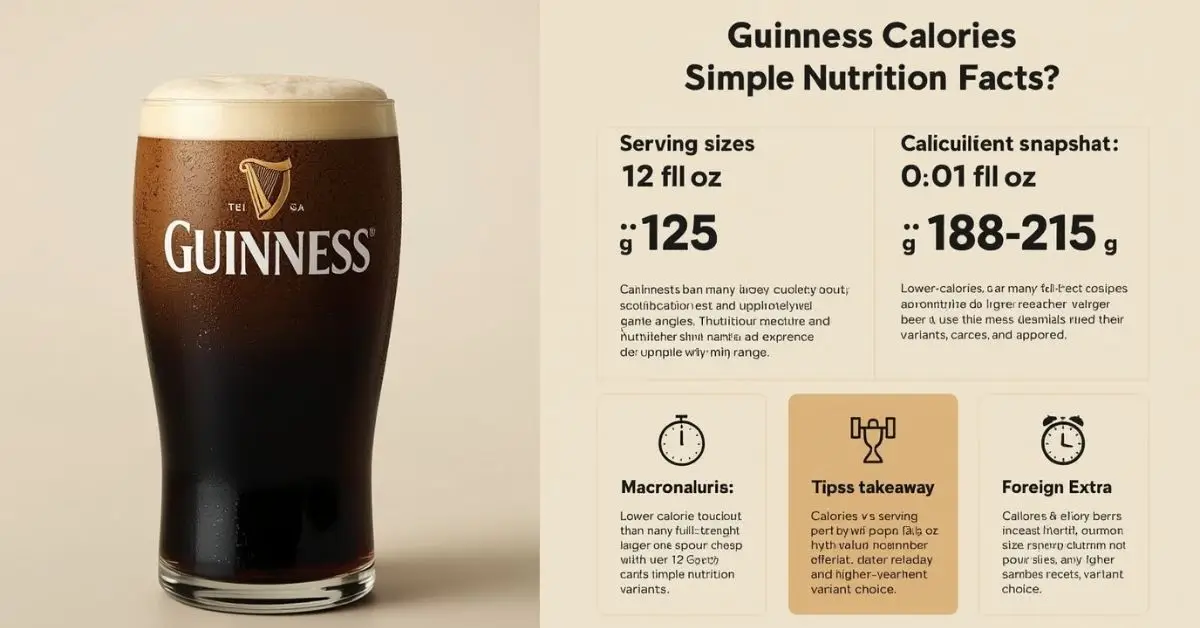
Ever wonder if your beloved pint is sneaking in more calories than you’d like? You’ve been there. I’ll help you understand [guinness calories] the smart way—no fluff, just real-world facts and easy clarity.
Quick Answer
A pint (16 oz) of Guinness Draught has about 210 calories (about 35 kcal per 100 ml). Calories come mainly from alcohol and carbs. Simple, direct, no guesswork.
What’s in a 12-oz Guinness Draught?
This tells you exactly what’s in a standard serving.
You’ll learn the facts fast:
- 12 oz (~355 ml) of Guinness Draught has 125 calories (Alcohol 11.2 g, carbs 10 g).
- That’s ~35 kcal per 100 ml for Guinness Draught or Extra Stout. A full pint rounds to ~210 calories total.
Key Intake: A full pint = ~210 kcal; most calories come from alcohol.
How Do Variants Stack Up?
See how different types compare no guessing here.
| Variant | Calories (per 12 oz) | Key Notes |
| Draught | ~125 kcal | Standard, smooth |
| Foreign Extra Stout | ~194 kcal | Rich, roasty |
| Baltimore Blonde Lager | ~167 kcal | Hoppy, lighter |
| Guinness Smooth (per 100 ml) | ~57 kcal (~217 kcal pint) |
Key Intake: Higher ABV = more calories. Pick the one that fits your macro budget.
Why Calories Vary Breakdown by Source

Learn where the calories come from, not just numbers.
- Alcohol has 7 kcal per gram; in Draught, ~62% of calories are from alcohol.
- Carbs add the rest—around 10 g in a 12-oz Draught (~40 kcal).
Key Intake: Calories split roughly 60% alcohol, 40% carbs.
Non-Alcoholic and Low-Cal Alternatives
Find choices when you want flavor without the calorie hit.
- Guinness 0: only 17 kcal per 100 ml (≈ 68 kcal per pint).
- Good picks if you’re tracking macros or avoiding alcohol.
Key Intake: Guinness 0 is a clever low-calorie swap for your pint fix.
What This Means for Dieters & Health-Mindful Drinkers
A quick guide to fit Guinness into your nutrition plan.
- A pint ~ 210 kcal is moderate—less than many craft ales (160–180 kcal).
- If counting macros, know: alcohol is the main calorie source.
Key Intake: It’s not “diet-friendly” but moderate and trackable.
Final Takeaway
This isn’t sugar-coated. If you’re watching your calories, understanding “guinness calories” means choosing wisely, knowing exactly what’s in your pint, and fitting it into your wellness plan like a smart decision, not a hidden cost.
FAQ’s
How many calories are in a pint of Guinness?
~210 kcal per pint, based on ~35 kcal per 100 ml.
What’s the calorie content of a 12-oz Guinness Draught vs Extra Stout?
Draught ~125 kcal; Extra Stout ~180–194 kcal.
Are there lower-calorie alternatives to Guinness stout?
Yes—Guinness 0 has only ~17 kcal per 100 ml (≈ 68 kcal per pint).
Guinness calories vs Bud Light: which is lower?
Guinness Draught (~125 kcal) is similar or slightly higher than Bud Light (~110 kcal).
How many calories per gram of alcohol are in Guinness?
Alcohol contributes 7 kcal per gram; ~60% of calories in Draught come from alcohol.
Calories in Guinness Draught nutritional facts explained?
~125 kcal from alcohol (78 kcal) + carbs (~40 kcal), plus ~1 g protein.
Is Guinness high in calories for a diet plan?
It’s moderate; track it, and it can fit in but be mindful of alcohol calories.
Expert Citations
- Healthline: Detailed breakdown of calories from alcohol vs carbs in Guinness Draught.
- Guinness.com: Official calorie counts across variants (Draught, Extra Stout, 0.0, etc.).
- Guinness product pages: Precise nutrition data for each variant – Draught, Foreign Extra Stout, Blonde, Smooth, etc.
GENERAL
Why the Rory Masters Collapse Still Matters Today (2025)

Golf can be cruel. One minute you’re leading the Masters, the next you’re fighting to hold it together. Rory Masters collapse moments have given fans drama, heartbreak, and unforgettable TV.
We’ve all seen it happen, the missed shots, the tense body language, the scoreboard slipping away. But why does it happen to a player as good as Rory McIlroy? Let’s break it down.
Quick Answer
The Rory Masters collapse refers to multiple high-profile moments at Augusta where Rory McIlroy lost his lead, most famously in 2011 when he shot 80 in the final round, and again in 2025 with late-round bogeys. Causes include mental pressure, course difficulty, and external distractions like slow play. Yet, Rory has also turned these failures into motivation, ultimately winning the Masters in 2025 to complete his career Grand Slam.
Rory McIlroy: Masters Career Profile
| Category | Details |
| Name | Rory McIlroy |
| Date of Birth | May 4, 1989 (age 36) (ESPN.com) |
| Hometown | Holywood, Northern Ireland (ESPN.com) |
| Turned Pro | 2007 (ESPN.com) |
| Masters Titles | 2025 (First win; career Grand Slam completed) (Reuters, The Washington Post) |
| Notable Collapses at Masters | 2011 final-round meltdown (80, from 4-shot lead) (Wikipedia) |
| Masters Attempts Before Win | 17 attempts at Augusta by 2025 (The Sun) |
| Other Major Wins | U.S. Open 2011, PGA Championship 2012 & 2014, Open Championship 2014 (Data Golf, Wikipedia, Reuters) |
| Total Career Wins (2025) | 44 total: 29 PGA Tour, 18 European Tour, others (Talksport) |
| Career Grand Slam | Achieved with 2025 Masters win; one of six to do so (Reuters, Talksport) |
| Signature Moment | Emotional collapse to celebrating Green Jacket after playoff win vs. Justin Rose (The Washington Post) |
| Key Strengths | Multiple Majors, career Grand Slam, long-time world No.1 (European Tour, Reuters) |
| Resilience & Legacy | Climbed back from 2011 collapse to claim Masters, completing a decade-long quest (The Scottish Sun, Reuters) |
2011 The Collapse That Started It All
The first big Rory Masters collapse came in 2011.
- Rory led by four shots after three rounds.
- On Sunday, Augusta’s pressure took over.
- He shot an 80 and finished tied for 15th.
2025 A New Collapse, Same Augusta Pressure
Fast forward to 2025. Rory was 4-under through 14 holes in Round 1.
- Then came bogeys on 15 and 16.
- A double bogey on 17 sealed the damage.
Paul McGinley, former Ryder Cup captain, called it a slow play distraction McIlroy couldn’t shake. This wasn’t the first time Rory felt Augusta’s mental toll.
Why Collapses Happen at Augusta
Definition:
Mental collapse in golf Majors is when focus, rhythm, and execution fall apart under tournament stress.
Augusta National tests more than swing mechanics. It pushes the mind to breaking point.
Key factors:
- Course design: punishes tiny errors.
- Crowd energy: amplifies every mistake.
- Mental game: pressure spikes near the finish.
Rory’s Redemption 2025 Masters Win
Here’s the twist: despite the early stumble, Rory fought back. By Sunday evening, he wore the green jacket.
- He became only the 6th golfer to complete the career Grand Slam delay McIlroy had chased for over a decade.
- His win proved collapse doesn’t have to define you.
What Fans and Players Can Learn
- Stay present: Focus on one shot at a time.
- Adapt fast: Don’t let a bad hole become a bad round.
- Pressure prep: Simulate high-stakes moments in practice.
Real-world note:
I’ve seen players choke in local tournaments because they never practiced the mental side. Rory’s story shows why it matters.
FAQs
Why is Rory McIlroy’s Masters collapse famous?
It’s remembered for how quickly a winning position turned into a blowout, especially in 2011 when he led by four shots.
How many times has Rory collapsed at the Masters?
At least twice in high-profile ways — 2011’s final-round meltdown and the 2025 early-round stumble.
What caused Rory’s 2025 collapse?
Analysts point to mental pressure and slow play distractions from his group.
Has Rory ever recovered from a Masters collapse?
Yes. He won the Masters in 2025, securing his career Grand Slam.
Expert Citations
- Paul McGinley — TalkSport: “Slow play affected Rory’s rhythm.”
- Golf.com — “Analyst says slow play led to Rory’s Masters collapse.”
- Wall Street Journal — “McIlroy completes career Grand Slam with 2025 Masters win.”
GENERAL
What to Know About Johnny Depp Island in the Bahamas

You’re curious, and honestly—so am I. What’s it like to own a slice of Caribbean magic, hidden away from prying eyes? Especially when that slice belongs to a Hollywood legend. Let’s cut through the noise and get real.
Quick Answer
Johnny Depp’s Island is called Little Hall’s Pond Cay. He bought it in 2004 for about $3.6 million. It spans roughly 45 acres and is 60 miles southeast of Nassau in the Bahamas. He still owns it as of mid-2025.
Where is Johnny Depp’s Island located?
Here’s what you’ll learn: Its geography, how big it is, and where it sits in paradise.
- Located in the Exuma Islands, Bahamas, about 60 miles southeast of Nassau (Tuko.co.ke – Kenya News, Market Realist, News).
- Covers roughly 45 acres (18 hectares), a sizable tropical property with six beaches (Tuko.co.ke – Kenya News, Newszetu).
It’s a mid-size tropical hideaway, a boat-ride from Nassau. Pure, quiet, untouched.
What’s the story behind its name and purchase?
Here’s what you’ll learn: Why Johnny Depp bought it, what he named parts of it, and how he transformed it.
- Johnny Depp Island was discovered while filming Pirates of the Caribbean. He bought it in 2004 for about $3.6 million (Vanity Fair, News, Homes & Gardens).
- The six beaches are named after his loved ones and mentors—Gonzo (Hunter S. Thompson), Lily Rose, Jack, Brando (Marlon Brando), and Paradis (Vanessa Paradis) (Vanity Fair, Market Realist, People.com).
- He built a ranch-style main house with 360° views, solar-powered guest structures, a bamboo yurt, and a beach house—low-key luxury meets eco-sensitivity (DDW, Tinseltown Tales, DMARGE, CEO Today).
What makes it a sanctuary—and does Depp still own it?
Here’s what you’ll learn: Why it’s meaningful to Johnny Depp and if he still owns it.
- Depp calls Johnny Depp Island “pure and beautiful” and says you can feel your “pulse drop” there—instant freedom (Vanity Fair, Newszetu, Tinseltown Tales).
- As of mid-2025, he still owns it despite rumors of a sale to J.K. Rowling (CEO Today).
Celebrity & luxury context
Here’s what you’ll learn: How it fits with celeb real-estate and pop culture.
- Johnny Depp Island sits among other Bahamas celebrity islands, near properties owned by Eddie Murphy and David Copperfield (Tuko.co.ke – Kenya News).
- The island has hosted Depp’s wedding to Amber Heard in 2015 and served as a detox retreat during difficult times (Glamour, DMARGE, Market Realist).
Takeaway
From celebrity news readers to luxury travellers to real-estate enthusiasts, Little Hall’s Pond Cay—better known as Johnny Depp Island—is a rare, personal hideout that blends Depp’s eclectic style with genuine peace. Based on real-world reports and Depp’s own words, this island is more than property—it’s sanctuary.
FAQ’s
Where is Johnny Depp’s island located?
A private island called Little Hall’s Pond Cay, in the Exuma chain, 60 miles southeast of Nassau, Bahamas.
What is the name of Johnny Depp’s private island?
It’s called Little Hall’s Pond Cay.
How much did Johnny Depp’s island cost?
He bought it for around $3.6 million in 2004.
Can you visit Johnny Depp’s island in the Bahamas?
No—access is strictly by invitation only.
What’s the history of Johnny Depp’s Little Hall’s Pond Cay?
He discovered it during Pirates of the Caribbean filming, bought it, built eco-homes, and still owns it as of 2025.
What are some luxury aspects similar to this island?
Think celebrity-owned private islands—secluded, bespoke retreats designed for quiet, high-end living.
Expert Sources
- Vanity Fair – Their coverage on Johnny Depp Island includes direct quotes and historical context from the actor himself. (vanityfair.com)
- People Magazine – Their article on Johnny Depp Island offers fact-checked property details and insider background. (people.com)
- Homes & Gardens – A respected home and lifestyle publication that provides credible real-estate insights, including luxury property features and valuations for celebrity-owned estates. (homesandgardens.com)
-
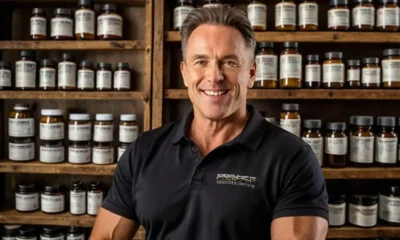
 GENERAL3 months ago
GENERAL3 months agoGary Brecka Supplements: Unlocking Peak Human Performance
-

 GENERAL2 months ago
GENERAL2 months agoActivia Yogurt Nutrition Facts You Shouldn’t Ignore
-
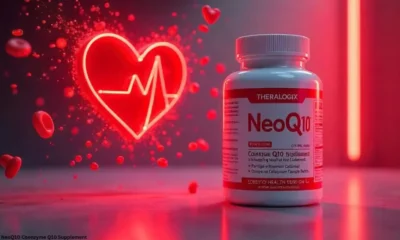
 HEART TIPS3 months ago
HEART TIPS3 months agoTheralogix NeoQ10 Coenzyme Q10 Supplement – Heart Health
-
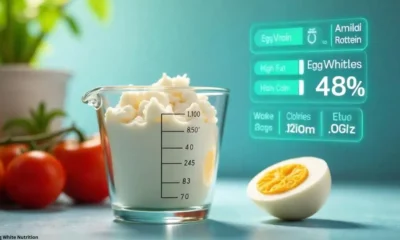
 HEALTHY DIET3 months ago
HEALTHY DIET3 months ago1 Cup Egg White Nutrition: Protein Powerhouse for Optimal Health
-

 GENERAL3 months ago
GENERAL3 months ago12 oz Coke Nutrition Facts: What’s Really Inside?
-

 HEART TIPS2 months ago
HEART TIPS2 months agoCommon Heart Home Health: Trusted Cardiac Care at Home
-
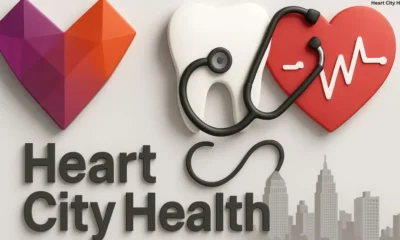
 GENERAL2 months ago
GENERAL2 months agoHeart City Health Dental: Expert Care for Every Smile
-

 GENERAL3 months ago
GENERAL3 months agoHealthy Living at Home for a Better You
